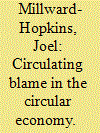| Srl | Item |
| 1 |
ID:
166521


|
|
|
|
|
| Summary/Abstract |
The transition from coal-based electricity to ‘carbon neutral’ biofuels derived from forests has catalysed a debate largely centred upon whether woody-biofuels drive deforestation. Consequently, a crucial point is often missed. Most wood pellets used in electricity production are derived from waste-wood; a practice considered acceptable by many otherwise strongly opposed to the industry. We highlight that, precisely because waste-wood is a ‘waste’, its carbon-neutral credentials should be questioned. We then examine a parallel development occurring within the same industrial system; the recovery of electricity producers’ combustion-ash residues for concrete production. Contrasting how accounting practices allocate upstream carbon to these ‘wastes’ in the cases of wood pellets and coal-ash reveals how decisions are shaped by industry imperatives, rather than established lifecycle techniques. If the politics of emissions allocation continue to evolve in this way, it may become increasingly difficult to distinguish where progress towards a low-carbon, environmentally sustainable and circular economy is real, from where it is an artefact of biased and inconsistent accounting practices.
|
|
|
|
|
|
|
|
|
|
|
|
|
|
|
|
| 2 |
ID:
179723


|
|
|
|
|
| Summary/Abstract |
This paper provides a review of the recent academic literature on how individual countries or regions can successfully implement unilateral climate policies in an increasingly integrated world economy. It first reviews the theory, empirics and future projections of ‘carbon leakage’, i.e. the notion that more ambitious climate policies will pose an incentive for energy-intensive industries to relocate and thus undo at least some of the achieved emission reductions. It then discusses measures to reduce carbon leakage. These include free allocation of emission permits to firms deemed at risk of carbon leakage, targeted trade policies as well as international cooperation to promote climate policies in third countries. Finally, it provides an overview of the debate on responsibility for trade-related emissions, including production- and consumption-based emission accounting as well as some more recent approaches.
|
|
|
|
|
|
|
|
|
|
|
|
|
|
|
|
| 3 |
ID:
149931


|
|
|
|
|
| Summary/Abstract |
This article questions the assumption that carbon markets create a level playing field by exploring the relationship between the organisation of capital and the organisation of emissions in the European Union Emissions Trading System (EU ETS). It constructs a database by matching installations and owners to reveal that a relatively small number of large-scale coal-fired power stations, owned by a very small group of states and corporations, are responsible for a significant proportion of greenhouse gas emissions. The findings are analysed by considering how technological dependence on coal together with the corporate institutional form combine to support the socio-spatial concentration and centralisation of capital and emissions. Case studies of the consolidation of the seven largest polluting owners from Europe's coal-dependent electricity sector and the carbon trading strategies of the two largest polluters, RWE and E.ON, then assess the impacts of energy liberalisation and emissions trading policies. The article concludes that EU energy and climate policies are pulling in different directions by clustering responsibility for greenhouse gas emissions and diffusing responsibility to address climate change. The uneven distribution of emissions within the EU ETS makes an alternative policy approach that directly targets the biggest corporate and state polluters both feasible and necessary.
|
|
|
|
|
|
|
|
|
|
|
|
|
|
|
|
| 4 |
ID:
176769


|
|
|
|
|
| Summary/Abstract |
The United States (U.S.) electric power sector historically comprises the largest portion of greenhouse gas (GHG) emissions from the world's second-largest GHG emitter. Consequently, carbon accounting methods employed for this economic sector play an important role in ensuring the accuracy of carbon accounts globally. For the U.S., the diverse purposes and methods of eight federal data products yield eight different estimates of U.S. electric-sector carbon dioxide emissions. Prior studies neither fully characterized these differences nor evaluated the data products' ability to capture changes in carbon dioxide emissions from certain now-minor sources of electricity that are projected to increase as the grid modernizes. Here we explore how shifts in electricity sources might impact current carbon accounting methods. We show that if no changes are made, four of the six data products could exclude (via omission or attribution) 1.1%–3.3% of carbon dioxide emissions from U.S. electricity generation in 2040. Maintaining comprehensive tracking of electric-sector emissions through the suggestions made herein can help enable efficient allocation of mitigation resources
|
|
|
|
|
|
|
|
|
|
|
|
|
|
|
|